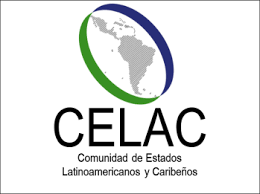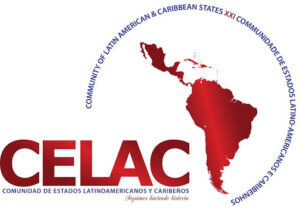
The Community of Latin American and Caribbean States (CELAC) is an intergovernmental mechanism for dialogue and political agreement, which includes permanently thirty-three countries in Latin America and the Caribbean.It is a regional forum that brings together all of Latin America and the Caribbean countries.Celac aspires to be a unique voice and structured decision-making policy decisions in the political and cooperation in support of regional integration programs.
It was created with a commitment to advance the gradual process of regional integration, unity and carefully balancing political,economic,social and cultural diversity of Latin America and the Caribbean of 650 million people.Since its launch in December 2011,the CELAC has helped to deepen respectful dialogue among all countries in the region in areas such as social development, education, nuclear disarmament, family farming, culture, finance, energy and the environment.
After two years of work, the CELAC has encouraged Latin American and Caribbean vision itself as a community of nations, capable of dialogue and consensus building on issues of common interest.By mandate of the Heads of State and Government, CELAC is the unified voice of the region on issues of consensus.
Regarding the representation of Latin America and the Caribbean; CELAC takes its faculties to act as spokesman for the Community with other countries and regional blocs. This includes the CELAC dialogue with the European Union,China,the Russian Federation,the Republic of Korea, the Cooperation Council for the Arab States of the Gulf, Turkey and Japan.
CELAC is the successor of the Rio Group and the Summit of Latin America and the Caribbean on Integration and Development (CALC). In July 2010, the CELAC selected former president of Venezuela, Hugo Chavez and Chilean President Sebastian Pinera, as co-chairs of the forum to draw up constitutions for the President of Cuba Raul Castro is leading organization.Presently CELAC. The next summit was held in Cuba in 2014.
As President of Mexico, Felipe Calderon declared: “We have decided, for the first time to form the Community of Latin American and Caribbean as comprises all regional states space.” Calderon said: “We can not remain disunited; We can not succeed in the future based on our differences; Now it’s up to us to unite undiscounted things that make us different to unite on the basis of our similarities far outweigh our differences.
 The countries forming the CELAC are: Antigua and Barbuda, Argentina, Bahamas, Barbados, Belize, Bolivia, Brazil, Chile, Colombia, Costa Rica, Cuba, Dominica, Ecuador, El Salvador, Granada, Guatemala, Guyana, Honduras, Jamaica, Mexico, Nicaragua, Panama, Paraguay, Peru, Dominican Republic, St. Lucia, St. Kitts and Nevis, St. Vincent and Grenadines, Trinidad and Tobago. Uruguay and Venezuela.
The countries forming the CELAC are: Antigua and Barbuda, Argentina, Bahamas, Barbados, Belize, Bolivia, Brazil, Chile, Colombia, Costa Rica, Cuba, Dominica, Ecuador, El Salvador, Granada, Guatemala, Guyana, Honduras, Jamaica, Mexico, Nicaragua, Panama, Paraguay, Peru, Dominican Republic, St. Lucia, St. Kitts and Nevis, St. Vincent and Grenadines, Trinidad and Tobago. Uruguay and Venezuela.
What purpose this mechanism created?
In order to promote regional integration and sustainable development, political cooperation, regional comprehensive agenda in forums: position the region to events of international scope; Promote dialogue with other States and regional organizations; Promote regional and subregional institutions for cooperation and communication between organizations, etc.
What is the way they work and how do they chose to work well?
CELAC makes decisions by consensus and is governed by rules adopted by the Heads of State and Government Summit in Caracas 2011.The State holding the Presidency Pro Tempore was Chile from December 2011 to January 2012, followed by Cuba, 2003 and currently Ecuador since 2015.
During its first year, which developments have been the best and in what field?
During 2012 the Pro-Tempore. President of Chile has launched CELAC and coordinated implementation of the mandates contained in the Declaration and Plan of Action-Caracas has been active as the First Meeting of Foreign Ministers of CELAC Troika (January), the First Meeting of Foreign Ministers in New York CELAC (September), participation in the United Nations General Assembly, in the subject area over forty issues’, highlighting the agreements reached at the meeting on Humanitarian Assistance, Energy, Finance, Infrastructure and Physical Integration, Environment, Immigration, cooperation and a Symposium on “advances and Challenges in Scientific Research on Treatment, Vaccine and drug Addiction Strategies. ”
Internationally, Celac was well received.An agreement to provide a forum for cooperation with China, strengthen ties with India, the meetings with the Russian Federation, the Republic of Korea, the Cooperation Council for the Arab States of the Gulf, Turkey was established, we take note of the progress in the dialogue on regional integration. .

